Industrial Scales: A Comprehensive Guide
Industrial scales are indispensable tools across a vast spectrum of industries, playing a critical role in ensuring accuracy, efficiency, and quality control. From measuring raw materials to verifying final product weights, these scales provide the reliable data necessary for smooth operations and regulatory compliance. In essence, industrial scales are more than just weighing devices; they are fundamental to commerce, manufacturing, and logistics.
This guide will provide a comprehensive overview of industrial scales, covering their diverse types, key applications, essential selection criteria, and the exciting advancements shaping the future of industrial weighing.
Section 1: Types of Industrial Scales
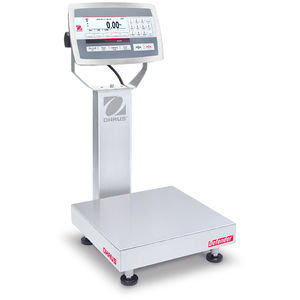
Industrial scales come in a variety of designs, each tailored to specific weighing needs and environments. Understanding the different types is crucial for selecting the right equipment for a particular application.
1.1 Bench Scales
Bench scales are compact, portable scales designed for tabletop use. They are commonly used for weighing smaller items, parts counting, and check weighing in laboratories, production lines, and retail settings. Bench scales offer a balance of accuracy and convenience, making them versatile tools for various weighing tasks.
Explore our range of Bench Scales.
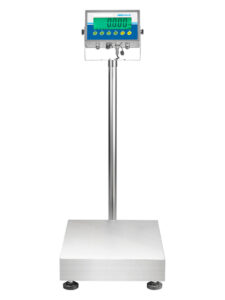 1.2 Floor Scales
1.2 Floor Scales
Floor scales are heavy-duty scales designed to weigh large, heavy objects such as pallets, containers, and drums. They are typically placed on the floor or set into a pit for easy loading and unloading. Floor scales are essential in warehouses, shipping and receiving departments, and manufacturing facilities where bulk materials are handled.
Discover our selection of Floor Scales.
1.3 Platform/Pallet Scales
Platform scales are a type of floor scale and cover a wide range of industrial weighing tasks. They can be used to weigh boxes, crates,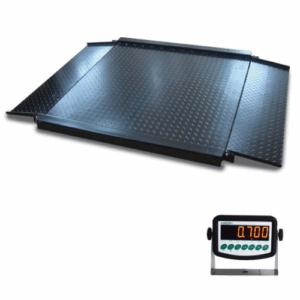
and other items that can be easily placed on the platform. Pallet scales, often U-shaped or low-profile platforms, are specifically designed for the efficient weighing of palletized goods, allowing for easy loading with pallet jacks or forklifts. These scales are commonly found in manufacturing, shipping, logistics, and processing environments.
Pallet Truck/Pallet Jack Scale Use Cases: Pallet truck scales (also known as pallet jack scales) integrate the weighing mechanism directly into a pallet truck, allowing for weighing as goods are moved. These are ideal for applications requiring on-the-go weighing, such as verifying incoming shipments, tracking inventory during movement, or calculating shipping weights directly at the point of packing or loading. Their portability and efficiency make them valuable for dynamic warehouse environments.
“Frive, a food preparation company, utilizes around 20 Ohaus Courier 7000 series indicators with integrated platform scales. These scales seamlessly integrate with their DHL warehouse management and shipping system, significantly improving throughput and reducing administrative tasks. This integration saves time and reduces the workload for employees, ultimately saving money for the company.”
See our variety of Platform Scales and Pallet Scales.
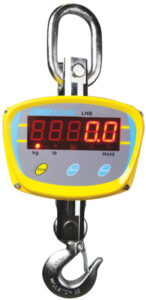 1.4 Crane Scales
1.4 Crane Scales
Crane scales are suspended scales that hang from a crane or hoist. They are used to weigh suspended loads, eliminating the need to place the items on a platform. Crane scales are valuable in heavy industrial settings such as steel mills, foundries, and construction sites.
View our Crane Scales options.
1.5 Precision Scales/Balances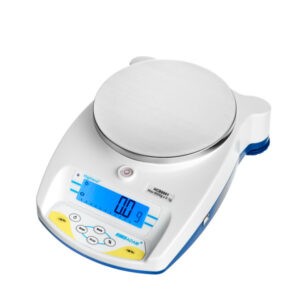 Precision scales and balances are high-accuracy weighing instruments used in laboratories and other settings where precise measurements are essential.
Precision scales and balances are high-accuracy weighing instruments used in laboratories and other settings where precise measurements are essential.
They are designed to measure small quantities with a high degree of accuracy and are crucial for research, quality control, and formulation.
Explore our Precision Scales and Lab Balances.
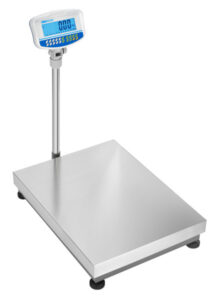 1.6 High-Capacity Scales
1.6 High-Capacity Scales
High-capacity scales are engineered to handle heavy loads, often exceeding 150kg’s. These scales are vital in industries dealing with substantial materials, such as items in drums, heavy manufacturing, and large-scale logistics. Their robust construction and precise measurement capabilities ensure accurate weighing of the heavier items.
For more details on solutions for extreme loads, read our guide on High-Capacity Industrial Scales for Heavy Loads, Coming Soon!
1.7 ATEX Scales
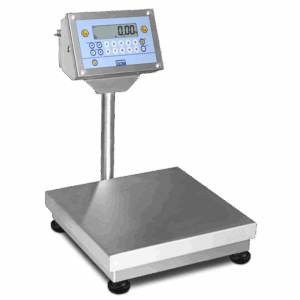
ATEX scales are specifically designed for use in potentially explosive atmospheres, such as those found in chemical plants, oil refineries, and flour mills. These
scales adhere to stringent safety standards to prevent ignition and ensure the safety of personnel and equipment. They can also be found in floor scale/palletscale formats.
To understand safety requirements, refer to ATEX Scales: Ensure your Safety in Hazardous Environments.
Section 2: Applications of Industrial Scales
Industrial scales find application across a wide range of industries, playing a vital role in various processes.
2.1 Manufacturing
In manufacturing, industrial scales are used for a variety of purposes, including:
- Raw Material Weighing: Ensuring accurate measurement of incoming materials.
- Quality Control: Verifying the weight of products at different stages of production.
- Inventory Management: Tracking the quantity of materials and finished goods.
2.2 Logistics and Shipping
Industrial scales are essential in logistics and shipping for:
- Shipping Weight Determination: Calculating accurate shipping costs.
- Freight Calculation: Ensuring compliance with weight restrictions.
2.3 Agriculture
In agriculture, industrial scales are used for:
- Crop Weighing: Measuring the yield of harvested crops.
- Livestock Weighing: Monitoring the weight of animals for health and management purposes.
2.4 Construction
Industrial scales play a crucial role in construction for:
- Material Weighing: Measuring the weight of aggregates, cement, and other materials.
- Mixing: Ensuring accurate proportions in concrete and asphalt production.
2.5 Waste Management and Recycling
Industrial scales are used in waste management and recycling to:
- Weight of Materials: Determine the weight of incoming and outgoing waste materials for processing and disposal.
2.6 Food and Beverage Industry
Industrial scales are critical in the food and beverage industry for:
- Ingredient Weighing: Ensuring precise measurements of ingredients in recipes.
- Packaging: Verifying the weight of packaged products to meet labelling requirements.
- Quality Control: Monitoring product weight to maintain consistency.
“• Greencore purchased the Ohaus 6000 industrial scales for target weighing for pre-preprepared salads. This meant that they could utilise the “traffic-light” checkweighing function to reduce giveaway and speed up production. This meant that wastage of ingredients was reduced, and the products were more consistent as the same amount of each ingredient was used every time. This also sped up the production line meaning it was more efficient, and the yield was increased.”
For detailed insights, read about The Role of Industrial Weighing Scales in the Food and Beverage Industry.
2.7 Unexpected Industries
Industrial scales are also found in some unexpected industries, highlighting their versatility:
- Pharmaceuticals: For precise measurement of ingredients in drug manufacturing, crucial for dosage accuracy and compliance.
- Aerospace: For weighing components and ensuring aircraft balance, vital for safety and performance.
Discover more in Which Unexpected Industries Rely on Industrial Weighing Scales?.
Section 3: Factors to Consider When Choosing Industrial Scales
Selecting the right industrial scale is crucial for ensuring accuracy, efficiency, and safety. Several factors must be considered:
3.1 Weighing Capacity
Weighing capacity refers to the maximum weight that the scale can accurately measure. It’s essential to choose a scale with a capacity that exceeds the heaviest load you’ll be weighing to prevent damage and ensure accurate readings.
3.2 Accuracy and Readability
Accuracy refers to how close the scale’s measurement is to the actual weight, while readability is the smallest increment that the scale can display. The required level of accuracy and readability depends on the specific application, ensuring compliance and product quality.
3.3 Durability and Construction
Industrial scales are often used in harsh environments, so durability and robust construction are essential. Factors to consider include the materials of construction (e.g., stainless steel for corrosive environments), protection against dust and moisture (IP ratings), and resistance to impact and vibration for long-term performance.
3.4 Features and Functionality
Modern industrial scales offer a range of features and functionalities that enhance their utility:
- Tare Function: To easily zero out the weight of containers or packaging, providing the net weight of the product.
- Data Connectivity: To transmit weight data to computers, printers, or other management systems for seamless record-keeping and analysis.
- Check Weighing: To quickly verify if a product’s weight is within a specified acceptable range, speeding up quality control processes.
“Sanofi in Haverhill significantly enhanced their stock management and product conformity using a Dini-Argeo ATEX pallet truck scale. Equipped with a Bluetooth communication card, this scale wirelessly transmitted weight data to a printer located in a ‘safe’ area. This seamless data capture directly supported accurate inventory management, helped prove product conformity, and contributed to reducing wastage and maintaining precise dosage accuracy in their pharmaceutical operations.”
3.5 Calibration and Maintenance
Regular calibration is essential to ensure the accuracy of industrial scales over time, maintaining their reliability and compliance. Maintenance, including routine cleaning and inspection, is also crucial for prolonging the life of the scale and preserving its performance.
Learn more about the importance of Scale Calibration, Coming Soon!
3.6 Legal Requirements and Compliance
In many industries, industrial scales must comply with legal requirements and regulations, such as those related to trade and measurement. In the UK, this often involves adherence to the Weights and Measures Act, ensuring that scales used for commercial transactions are “trade-approved” or “legal for trade.” Furthermore, integration with quality management systems like ISO 9001 can provide additional assurance of accuracy and reliability, demonstrating a commitment to quality control and regulatory adherence.
3.7 Cost Considerations
The cost of industrial scales can vary widely depending on the type, capacity, accuracy, and features. It’s important to balance the initial investment with the long-term value, including operational efficiency gains and reduced waste, to achieve a strong return on investment.
Get a breakdown of factors influencing price in How Much Do Industrial Scales Cost?.
3.8 Purchasing Guide
A purchasing guide helps streamline the selection process, ensuring buyers consider all critical factors before investing in an industrial scale/balance that precisely meets their operational needs.
Consult our comprehensive Purchaser’s Guide to Buying an Industrial Scale/Balance.
3.9 Where to Buy
Choosing a reputable supplier is paramount to ensure you acquire a high-quality scale, benefit from reliable after-sales support, and receive expert advice tailored to your specific application. Scales and Balances.co.uk is proud to be rated 5.0★ on Feefo with over 1,000 reviews, reflecting our commitment to reliable delivery, complete calibration, and standout service. As one satisfied customer from Leeds put it, “Great Customer Service. Very efficient.”
Find out more in Where to Buy the Best Industrial Scales and Top Industrial Scales: Where To Get The Best.
Section 4: The Future of Industrial Weighing
The field of industrial weighing is constantly evolving, driven by technological advancements and changing industry needs.
4.1 Digitalization and Connectivity
Digitalization is transforming industrial weighing, with scales becoming increasingly connected to computer networks and data management systems. This connectivity enables real-time data collection, remote monitoring, and improved efficiency across the supply chain, moving towards “Industry 4.0” principles.
“A customer of ours Polypipe implemented a weighing system to control production. This used their waste plastics from production to be re-purposed and used to form more product leading a virtually 100% waste free solution.”
For a deeper understanding of this shift, explore Industry 4.0 and the IoT.
4.2 Automation
Industrial scales are being seamlessly integrated into automated production lines and processes. This integration allows for continuous, high-speed weighing and data capture without manual intervention, significantly improving throughput, accuracy, and overall operational efficiency.
4.3 Data Analytics
The vast amount of data generated by connected industrial scales is becoming increasingly valuable for data analytics. By analysing weight data, businesses can gain deep insights into production processes, optimise inventory management, and predict maintenance needs, driving informed decision-making.
Learn more about The Benefits of Smart Scales in the Warehouse, Coming Soon!
Conclusion
Industrial scales are essential tools for a wide range of industries, providing accurate and reliable weight measurements that are crucial for efficient operations, quality control, and regulatory compliance. Choosing the right industrial scale requires careful consideration of factors such as weighing capacity, accuracy, durability, and features.
As technology continues to advance, the future of industrial weighing will be shaped by digitalization, automation, data analytics, and sustainability. By staying informed about these trends and partnering with a knowledgeable supplier like Scales and Balances.co.uk, businesses can leverage the power of industrial scales to optimise their processes, achieve their strategic goals, and ensure long-term success. We are proud of our excellent customer service and fast delivery, as highlighted by customers like Ian Watts from Hertford, who simply states: “Excellent. Very fast delivery.”
Ready to upgrade your weighing? Don’t let inaccurate measurements hinder your operations. Browse our extensive selection of industrial scales today to find the perfect solution for your business, or contact us for expert advice on selecting the right equipment.
🔗 [Book Calibration Services with Us]
Blog written by: The scalesandbalances.co.uk sales team, drawing on the experience of operations director (ex engineer, 19 years experience at time of writing.) Stuart Kemp.
Date:12th June 2025 (Updated:23rd July 2025)
Need more information? Read also these related Industrial Scale blogs:
The Power of Smart Weighing Systems: IoT Integration in Modern Industry
Which Unexpected Industries Rely on Industrial Weighing Scales?
The Role of Industrial Weighing Scales in the Food and Beverage Industry

 Feefo 5.0* 1000+ reviews
Feefo 5.0* 1000+ reviews UK wide delivery on all products
UK wide delivery on all products Products can be fully calibrated & certified
Products can be fully calibrated & certified Service & repairs at competitive prices
Service & repairs at competitive prices Find a better price and we will try and beat it
Find a better price and we will try and beat it



